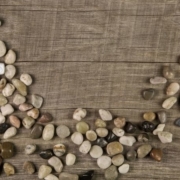Matching the Message
BY AJ ROWE | December 5, 2022
Sunday’s Readings
John the Baptist is a common figure in gospel readings throughout Advent—after all, who would be a better guide through the season than the biblical poster child for repentance, paving the way for the coming of Christ?
At first, this reading is easily interpreted as another warning to repent before it’s too late, but let’s dig a little deeper. First, let’s look at John the Baptist and his presence in the gospels. Through his message of repentance, John is often seen as someone paving the way for the ‘new’ that Jesus will bring. The Pharisees and Sadducees in the bible, who also appear in this reading, are often representatives of the old religious and social elite, respectively. John warns them that their status as children of Abraham will not be enough to earn their salvation, and that their actions need to reflect their words, because “the one who follows me is more powerful than I am.”

Even if we’re boiling this reading down to a metaphor about actions speaking louder than words, it can be an uncomfortable read. John is portrayed as wild and naturalistic, wearing camel fur and eating foraged food—while we can rest easy knowing we aren’t the Pharisees and Sadducees, we’re also strongly reminded that we’re no John the Baptist either. While I’m not arguing that we need to eat locusts and wear primitive clothing, I do think that we’re being encouraged to reflect on our own actions and ensure that they match what we say. In what ways can we improve our actions so that they might better match the message of justice we preach? And how can we be more like John, in our own personal ways, or through ISN’s Advent Simplicity Challenge this year?
AJ Rowe joined the Ignatian Solidarity Network staff in 2021 as digital communications coordinator. They grew up in Detroit, Michigan, and received a Jesuit education through both high school and college, graduating from John Carroll University in 2021.










While few of us are able to live without clothes, we can choose to wear and buy only clothes made from natural fibres and preferably made by hand in the region where we live. Rayon textiles and other textiles that are said to come from plant material damage our environment with all the chemicals used in their manufacture.
We can better care for our environment buy growing and only eating food grown in our own region. Importing organic food which has travelled long distances to reach the local supermarket and been artificially ripened along the way is not caring for our environment.
We can value our water source by using only a bucket of water a day to wash in wherever we happen to be living.
If I had my own home I would grow my own food. As I have no fixed abode I try to support local growers wherever I am.
Practicing justice in thought, word, and actions adds life to one’s life span. Long live justice.